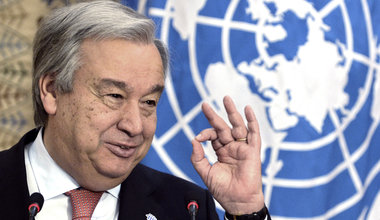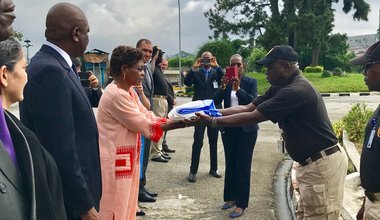Daily Brief on Côte d’Ivoire for Thursday, 8 January 2009
Highlights
- SRSG holds meetings with diplomatic corps,
presidents of RDR and PDCI;
and voter registration;
arms embargo inspections;
rights violation
SRSG holds consultations with diplomatic
corps, presidents of RDR and PDCI
The Special Representative of the Secretary General for Côte d'Ivoire, Mr. Y. J.
Choi, met this morning with the President of the Rassemblement des Républicains
(RDR) Mr. Alassane Dramane Ouattara, as part of his regular consultations with
members of the Standing Consultative Group (CPC) which meets in the context of
the Ouagadougou Political Accord (OPA). SRSG Choi said the encounter took place
at a very important time, because it happened just before the meeting of the
United Nations Security Council on 21 January, and after the decision of the CPC
on identification and elections, which supported the signing of the fourth
complementary accord to the OPA.
This afternoon Mr. Choi hosted a meeting of the diplomatic corps at UNOCI
headquarters and at the end of the day, he is scheduled to meet with Henri Konan
Bédié at his home in Abidjan. All three meetings are routine consultations that
give the UN Special Representative a chance to share and gather information
about the implementation of the OPA.
The UN Secretary General's 19th progress report on the UN Operation in Côte
d'Ivoire (UNOCI) will be published tomorrow. SRSG Choi will be travel to the
United Nations headquarters in New York next week ahead of the presentation of
this report to the Security Council, scheduled for 21 January 2009.
Elections and identification
In a statement to the media today, following his meeting with the President of
the RDR, the SRSG stated that in spite of some difficulties, the overall
identification process must be seen in a positive light. "We have thus far
identified more than three million people, and in a few months the process will
be finished," he said. Mr. Choi also reiterated the strong commitment of the
international community, which continues to provide logistical, technical and
financial support for the process.
UNOCI military, police and civilian personnel yesterday continued to monitor
collection centres around the country. A problem was reported at the Bardot
North Centre in the southwestern town of San Pedro: a group of Young Patriots
went into the centre, molested enrolment agents, and took two SAGEM kits used
for the process. It was reported that the security personnel on duty at the
centre did not react. The chairman of the San Pedro branch of the Independent
Electoral Commission (IEC) ordered the collection centre closed. Meanwhile,
centres in the eastern town of Bondoukou were not opened due to the fact that
the local IEC branch has not been activated.
Embargo Inspections
UNOCI military and police successfully carried out seven arms embargo
inspections yesterday. Sites inspected were the Defence and Security Forces of
Côte d'Ivoire (FDS-CI) gendarme brigade in Gouméré (near Bondoukou); the
gendarme brigade in Tengrela (north), the Armed Forces of the Forces Nouvelles (FAFN)
battalions in Séguela and Man (west), the FDS-CI regrouping sites in the western
locations of Ouyatouo (near the western town of Danane) and Duékoué, and the FDS-CI
command and support battalion in Abidjan.
HIV-AIDS
Two major HIV-AIDS sensitization operation targeting demobilized soldiers and
prisoners are being planned by UNOCI's HIV-AIDS and Rule of Law Sections. The
campaigns will take place in Bouaké. Final plans are being reviewed, but one
important feature of the operations is related to voluntary HIV/Aids screening
to be organized in response to several requests made by prisoners themselves
over the last months. The proposed HIV-AIDS sensitization operations, which are
backed by UNDP and UNFPA, were preceded by a special training session for 24
peer educators, including 14 soldiers from the Yamoussoukro-based Integrated
Command Center (ICC) and 10 from the FAFN.
Human Rights
Acts of violence by members of the Fédération Estudantine et Scolaire de Côte
d'Ivoire (FESCI) and rival student groups continue to jeopardize the right to
education and to disturb the normal running of secondary schools across the
country. Since 5 January, schools in Abidjan and Daloa have been closed due to
incidents related to dissensions among FESCI members and FESCI's refusal to
accept other student groups within schools. In the Abidjan district of Abobo,
members of the FESCI and the newly established Syndicat des Elèves et Etudiants
de Côte d'Ivoire (SYCEECI) have repeatedly been fighting each other with knives,
machetes, iron sticks, truncheons and other hand weapons. In Daloa (centre
west), FESCI members have been clashing over the election of the FESCI
coordinator for the Haut Sassandra region and the FESCI general secretary in
Lycées I and III. Teachers in Daloa and the Abidjan district of Abobo, fearing
for their safety in the violent atmosphere at secondary schools, went on strike
to protest against the ongoing student violence.
On 3 January, the rider of a motorcycle was beaten with wooden sticks by seven
FAFN elements at the Camp Guépard in Bouaké. The victim had been summoned to the
camp after his former employer lodged a complaint against him for alleged damage
to the motorcycle. Wounds were visible on his face, arm and back. The Regional
Human Rights Office in Bouaké will follow up with the FAFN authorities at Camp
Guépard.
Ends
 ONU
ONU Nations Unies Maintien de la paix
Nations Unies Maintien de la paix



